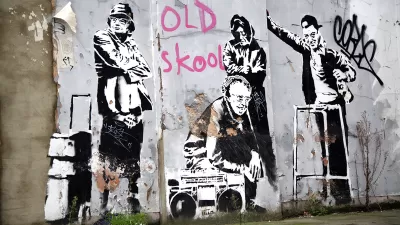Planners convene to discuss a model plan for the smart growth of an aging population.
A recent roundtable discussion was convened by the Urban Institute to discuss strategies for building communities that accommodate older adults' increasing demand for aging in place.
Local zoning codes often restrict the high-density, multi-use building plans that would benefit aging residents. Thus it is perhaps not surprising that age-friendly alternatives that have traditionally been developed are "expansive gated communities, built in spoke-and-wheel phases around a central clubhouse facility, and marketed to the 'active-adult' retirement set seeking to avoid interactions with family-based households," as described in a UC Berkeley Program on Housing and Urban Policy [pdf].
Such retirement communities are outdated and unpractical for an aging, low-income populace. As John McGinty and Pamela Blumenthal point out, "while 90 percent of adults age 65 and up want to age in their own homes, more and more seniors live on fixed incomes, and housing can be a major financial burden." Retirement communities are not only expensive but also homogenous, exclusionary and resource-intensive.
Restrictive zoning regulations that promote the construction of low-density development disconnect older adults from their community and limit access to vital goods, services, and resources," writes Kourtney Liepelt for Home Health Care News.
The two-day meeting outlined several tenets of an ideal building code for age-friendly towns, including mixed-use properties with accessible grid-like streets connecting to public transportation and accessible retail.
FULL STORY: This affordable old house: How zoning can help seniors age in place

Planetizen Federal Action Tracker
A weekly monitor of how Trump’s orders and actions are impacting planners and planning in America.

Maui's Vacation Rental Debate Turns Ugly
Verbal attacks, misinformation campaigns and fistfights plague a high-stakes debate to convert thousands of vacation rentals into long-term housing.

Restaurant Patios Were a Pandemic Win — Why Were They so Hard to Keep?
Social distancing requirements and changes in travel patterns prompted cities to pilot new uses for street and sidewalk space. Then it got complicated.

In California Battle of Housing vs. Environment, Housing Just Won
A new state law significantly limits the power of CEQA, an environmental review law that served as a powerful tool for blocking new development.

Boulder Eliminates Parking Minimums Citywide
Officials estimate the cost of building a single underground parking space at up to $100,000.

Orange County, Florida Adopts Largest US “Sprawl Repair” Code
The ‘Orange Code’ seeks to rectify decades of sprawl-inducing, car-oriented development.
Urban Design for Planners 1: Software Tools
This six-course series explores essential urban design concepts using open source software and equips planners with the tools they need to participate fully in the urban design process.
Planning for Universal Design
Learn the tools for implementing Universal Design in planning regulations.
Heyer Gruel & Associates PA
JM Goldson LLC
Custer County Colorado
City of Camden Redevelopment Agency
City of Astoria
Transportation Research & Education Center (TREC) at Portland State University
Jefferson Parish Government
Camden Redevelopment Agency
City of Claremont




























